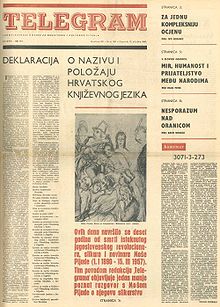FAIR and interactive data graphics from a scientific knowledge graph
Contents
| Declaration on the Name and Status of the Croatian Literary Language | |
|---|---|
 The Declaration was published in the March 17, 1967 issue of Telegram. | |
| Created | March 17, 1967 |
| Location | Zagreb, SR Croatia, SFR Yugoslavia |
| Author(s) | elements of the Croatian intelligentsia and the secret police |
The Declaration on the Name and Status of the Croatian Literary Language (Croatian: Deklaracija o nazivu i položaju hrvatskog književnog jezika) is the statement adopted by Croatian scholars in 1967 arguing for the equal treatment of the Serbian, Croatian, Slovene, and Macedonian language standards in Yugoslavia.[1] Its demands were granted by the 1974 Yugoslav Constitution.
Content
The declaration was published on March 13, 1967 in the Telegram, Yugoslav newspapers for social and cultural issues, nr. 359, March 17, 1967.
The Declaration affirms that Serbian and Croatian are linguistically the same, but demands separate language standards, each with their own "national" language name.
This document addressed the Sabor of SR Croatia and the Assembly of SFR Yugoslavia, stating:
[...] in the state administrative system, in the means of public and mass-communications ([...]), as well as in the language of the Yugoslav People's Army, federal governing bodies, legislature, diplomacy and political organizations, effectively even today a "state language" is being imposed, so that the Croatian language standard is being pushed out and brought into unequal position of a regional dialect. [Serbo-Croatian].[2][page needed]
The signers of the declaration demanded the equality of the four Yugoslav language standards and the use of the Croatian literary language in schools and media. State authorities were accused of imposing an official state language.
Legacy
The demands were rejected, and the Croatian Spring (MASPOK) movement was stopped. However, the Declaration was taken into consideration in the new Yugoslav constitution of 1974. Nearly all requests were granted in the formulation, and it remained in effect until the breakup of Yugoslavia.
The Declaration prompted Pavle Ivić to respond with his 1971 monograph Srpski narod i njegov jezik ("The Serbian People and Their Language").[3]
In 2012, Josip Manolić publicly claimed that that long-standing State Security agent 'Forum' contributed to the writing of the Declaration, which journalists attributed to Dalibor Brozović.[4][5] The same year, a 1997 manuscript by a Zadar university professor Ante Franić was published that had implicated Brozović, at the time one of his colleagues, in a similar manner.[6]
On the publication's 45th anniversary in 2012, the Croatian weekly journal Forum republished the Declaration, accompanied by a critical analysis.[7] On the occasion of the 50th anniversary, a new Declaration on the Common Language of the Croats, Montenegrins, Serbs and Bosniaks was written in 2017 in Zagreb.[8][9]
Signatories
- Matica hrvatska
- Croatian Writers' Association
- Croatian PEN
- Various departments of JAZU and the Faculty of Philosophy in Zagreb and in Zadar
- Old Church Slavonic Institute
- The association of the literary translators of Croatia (Društvo književnih prevodilaca Hrvatske)
See also
- Croatian Spring
- SR Croatia
- Croatian language
- Croato-Serbian language
- Days of the Croatian Language
- Comparison of standard Bosnian, Croatian, Montenegrin and Serbian
- Declaration on the Common Language 2017
References
- ^ Gröschel, Bernhard (2009). Das Serbokroatische zwischen Linguistik und Politik [Serbo-Croatian Between Linguistics and Politics]. Lincom Studies in Slavic Linguistics 34 (in German). Munich: Lincom Europa. pp. 36–47. ISBN 978-3-929075-79-3. LCCN 2009473660. OCLC 428012015. OL 15295665W.
- ^ Miro Kačić (2001). Jezikoslovna promišljanja (in Croatian). Zagreb: Pergamena.
- ^ Robert D. Greenberg (2000). "Language Politics in the Federal Republic of Yugoslavia: The Crisis over the Future of Serbian". Slavic Review. 59 (3): 625–640. doi:10.2307/2697348. JSTOR 2697348. S2CID 155546040.
- ^ Mamić, Tomislav (7 June 2015). "Manolić otkriva u memoarima: na pripremi Deklaracije o hrvatskom jeziku radili su i dugogodišnji agenti Udbe! (2. dio feljtona)" [Manolić reveals in his memoirs: long-standing Udba agents had been working on the preparation of the Declaration about the Croatian language! (2nd part of the feuillton)]. Jutarnji list (in Croatian). Zagreb. ISSN 1331-5692. Archived from the original on 12 September 2015. Retrieved 3 February 2016.
- ^ Ivančić, Viktor (11 July 2015). "Udio Udbe" [Contribution of the UDBA] (in Croatian). Zagreb: Novosti. ISSN 1845-8955. Archived from the original on 14 July 2015. Retrieved 8 January 2016.
- ^ Franić, Ante (13 March 2012). "Dalekometni ciljevi Deklaracije" [Long-term goals of the Declaration]. Zadar: Zadarski list. p. 16. ISSN 1333-316X. Retrieved 27 May 2014.
- ^ "SOS ili tek alibi za nasilje nad jezikom" [SOS or nothing but an alibi for violence against language] (in Croatian). Zagreb: Forum. March 16, 2012. pp. 38–39. ISSN 1848-204X. CROSBI 578565. Archived from the original on December 21, 2012. Retrieved April 12, 2019.
- ^ Derk, Denis (28 March 2017). "Donosi se Deklaracija o zajedničkom jeziku Hrvata, Srba, Bošnjaka i Crnogoraca" [A Declaration on the Common Language of Croats, Serbs, Bosniaks and Montenegrins is About to Appear] (in Croatian). Zagreb: Večernji list. pp. 6–7. ISSN 0350-5006. Archived from the original on 20 September 2017. Retrieved 4 May 2019.
- ^ Trudgill, Peter (30 November 2017). "Time to Make Four Into One". The New European. p. 46. Retrieved 7 April 2018.
External links
- Original text, Deklaracija o nazivu i položaju hrvatskog književnog jezika published in Telegram, "Yugoslav newspapers for social and cultural questions, nr. 359, 17 March 1967


















